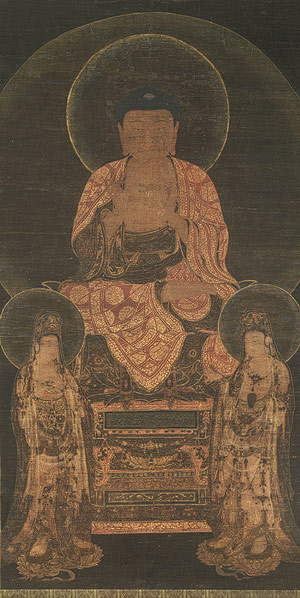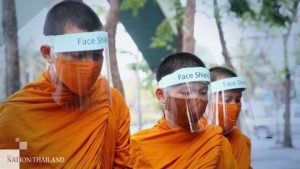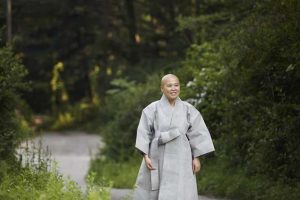
Pure Land practitioners are puzzled by a moral dilemma
Despite the fact that aspiring to be reborn in the Land of Bliss is the same as bodhichitta (to pursue Buddhahood by delivering sentient beings from samsara), how should a Pure Land practitioner relate to worldly matters in their intention to liberate sentient beings from suffering, such as relief work after natural disasters, charitable activities to help disadvantaged minorities, emergency assistance for people in danger, and volunteer work to help communities and societies?
Pure Land aspirants are often accused of being “cowards” who wish to escape from the defiled land (our world) to the Pure Land (the Land of Bliss) while leaving their fellow beings adrift in the sea of suffering. I know that many Buddhist friends are reluctant to aspire to be reborn in the Land of Bliss for this very reason. They further blame Pure Land practitioners for taking Amitabha-recitation as their exclusive practice and not participating actively in social networks to develop a good karmic relationship with others.
Many Pure Land practitioners may be puzzled by this moral dilemma. How can a Pure Land practitioner contribute to society without resorting to “self-power?” How should he or she care for people who are suffering in this world at present but also remain focused on attaining rebirth in the Land of Bliss without being called a “coward”?
Awareness of the limitations of our karmic practices
It is both practical and realistic that all Buddhists should care about the well-being of their communities and contribute to the good of society. However, as practitioners in the pristine Pure Land school, we seek Amitabha’s deliverance because we have reached a dead end and found no way to escape from samsara through our own power. Thus, we have to reflect honestly and carefully examine our own conscience and ask, “Can ordinary beings like us really deliver all sentient beings and lead them to ultimate happiness?”
Birth and death are the primary cause of suffering in our world, as we are all bound tightly by the karmic forces within the Six Realms. But how can we rescue drowning people if we ourselves cannot swim? The bodhisattva Nagarjuna said, “Pouring hot water onto an icy lake melts a small amount of ice, but the hot water will also turn to ice in a short while.”*
Unlike all other Buddhist teachings, the school of pristine Pure Land Buddhism is one that relies completely on “other-power.” We have deep faith: whatever we do, think, or believe, we are still ordinary, foolish beings because our mind is deluded and discriminative and our karmic actions are conditioned and unreal. Moreover, as ordinary beings, our karmic practices create impure, conditioned, and unreal merits and virtues that cannot be dedicated toward attaining rebirth in the Land of Bliss, which is a pure, unconditioned, and real land of reward.**
Acting as mirrors which help to reflect Amitabha’s light
Although we cannot deliver sentient beings to ultimate liberation, it does not mean that we should sit back and do nothing. We should perform virtuous and meritorious deeds out of a sense of duty and responsibility, according to our karmic circumstances and capacity. However, in doing so, we should know that there is no standard we need to meet, no stress to reach a goal, and no personal fame and fortune involved. It is similar to the attitude toward the Three Meritorious Deeds as discussed in my last article.
As Pure Land practitioners, all we need to do to ensure our rebirth in the Land of Bliss is to exclusively recite Amitabha’s name with the aspiration to return “home” to the Pure Land. And we should share our religious experience and encourage other people to aspire to be reborn in the Land of Bliss as well. We can also dedicate the merits and virtues of reciting Amitabha’s name and pray for people who are suffering and in need of help.
Jingxing, a Pure Land practitioner in Norway, recently shared his reflections on contributing to the wider community in his article titled “The Greenest and Freest Source of Energy.” He wrote: “But energized and supported by the Fundamental Vow [Amitabha’s 18th vow], we attain inexhaustible energy [in the form of Amitabha’s infinite light] through exclusive Amitabha-recitation; thus we can cast off all self-involvement and worry, and act as mirrors which help to reflect Amitabha’s light into a dark and pain-stricken world.”***
Instead of driving himself to “contribute” to society and “deliver” other people as a bodhisattva would, he shares the “surplus” energy he receives from Amitabha with them. Devoid of any idea of “self-power,” he acts as one guided by Amitabha Buddha. The energy is entirely Amitabha Buddha’s, and the resulting merit, if any, is also Amitabha’s. This is the attitude of a practitioner in the pristine Pure Land school towards bodhichitta, one of the core teachings in Mahayana Buddhism.
To conclude, as soon as a Pure Land practitioner settles his mind on Amitabha’s deliverance, he or she has taken Refuge in Amitabha Buddha. Not just the matter of rebirth in the next life, but all his or her personal affairs in this world fall under the compassionate care of Amitabha Buddha.
Exclusively reciting Amitabha’s name is really the only job done by the practitioner; the rest is guided by Amitabha Buddha. We entrust ourselves sincerely and joyfully to Amitabha, who acts in our best interests in all mundane and supramundane matters.
Because of the embrace and deliverance of Amitabha Buddha, we have no selfish interest in our service to the communities of this world. We are not trying to earn our deliverance. Even if benefits accrue and merits are attained, these are attributed to Amitabha Buddha, not to us. This is how an aspirant in the pristine Pure Land school practices bodhichitta.
* From the Treatise of the Paramita of Great Wisdom, translated from Chinese to English by the author
** Refer to the explication of Sincere Mind in the Commentary on the Contemplation Sutra by Master Shandao.
*** Published on www.purelandbuddhism.org






